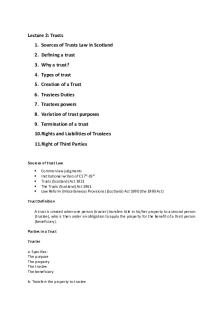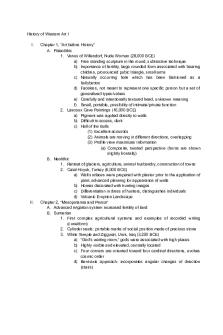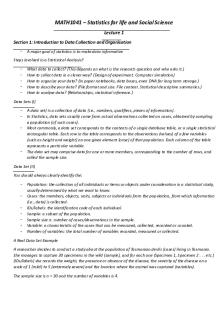HHON notes PDF

| Title | HHON notes |
|---|---|
| Author | Malvika Sridhar |
| Course | Grt Authors, Compsrs, & Artists |
| Institution | Indiana University Bloomington |
| Pages | 2 |
| File Size | 68.7 KB |
| File Type | |
| Total Downloads | 85 |
| Total Views | 127 |
Summary
German Music and Culture Notes...
Description
HHON233 German Music+Culture
Die Meistersinger: *Nuremberg *Luther: protestant revolution-translated bible into Germany *Cult of Nuremberg viewed Nuremberg as the center of history and German culture *Proliferation of German poetry *Knittlevers: form of poetry *Hitler had his Nazi rallies in Nuremberg *Nazis celebrated this opera by Wagner *Various trade guilds in Nuremberg at the time *audacious for Walther to just step in and decide to become a Meistersinger (as you must pass a test and it takes a lot of training) *Wagner participated in the revolution; wanted to have the aristocracy to be overthrown *Wagner wanted new government to subsidize the theater and make it free of charge to the general public *he fled into exile, wrote essays and books for 6 years and did not compose *started composing again in 1854 *a “music drama” *What was Wagner trying to do with Die Meistersinger? What was his goal? -celebrate the tradespeople more than the royalty seen in operas (looks more at the common people) - a celebration of the common German *Walther is an aristocrat who has become impoverished *The music Wagner is composing is music that Beckmesser would criticize, which is ironic. *through-composed *Look for: relationship between people on art *degree to which authentic creation is not based on copying *^Wagner’s thoughts on a Jewish musician copying German music The Case of Wagner-Nietzsche Criticizes Wagner’s work as well as his character Nietzsche met Wagner when he was 24 and Wagner was 55 Nietzsche was very familiar with his work Wagner exploited Nietzsche Birth of Tragedy- praises Wagner, credits him w/ resurrecting Greek Tragedy. Has united the two principles of the Apollonian and the Dionysian Nietzsche: The eternal return: history=cyclical Nietzsche: God was dead, ‘superhumans’ Nazis were highly influenced by Nietzsche “slave” morality : those who have no power decide that because of their suffering they are actually superior (Nietzsche said this was the basis of western morality and he thought it was a sham) Max Nordau – degeneration : those who grow weaker over time fail every society “comes to its height” and then decays. The Case of Wagner: Nietzsche turns against Wagner Nietzsche wanted to be a composer 17 years after German unification
Germans don’t recognize that Wagner gives them a false representation of themselves Uses Wagner’s arguments against him Why did Nietzsche turn on Wagner? Nietzsche’s doctor was a big fan of Wagner; Wagner wrote a letter to his doctor about what he thought Nietzsche’s problem was In the 19th century there was a belief that masturbation caused health problems such as Nietzsche’s ; this was considered a horrendous insult He believes German culture may not survive because it is “sick” (one indication- it likes Wagner) An attempt to save German culture Praises Wagner for expressing ideas in music like never before, says Wagner does not recognize that he is a minimalist Wagner is able to express emotion so briefly and in fleeting moments Wagner does not realize this because he thinks in totality Nietzsche claims Wagner’s success is a symptom of modernity Nietzsche – “Put Wagner in the middle class” to show how absurd they are Fi del i o
mor et hemesabouthumannat ur e:r evenge,hope,l ov e,et c .enl i ght enmenti deasar et her et oo butf ocus esonhumanf ol l y f emal er ol ei satt hef or ef r ontbutevent hen,shei sdi s gui sedasaman. beet hov enf el tNapol eoneffec t edenl i ght enmenti deal s:ex -Napol eoni ccode( i ncont r astt o f eudall awsast heywer epost r ev ol ut i onar y) Napol eonbr oughtaboutr el i gi ousf r eedom andl etj ewi shpeopl eat t ai nanyj obi nst eadofj ust bei ngus ur er s Al l oft hes ef undament alpr i nci pl esofl awwer esomet hi ngBeet hov enc hampi onedunt i l Napol eoncr ownedhi msel femper or ,whi c hBeet hov endi dnotl i k e Whatex act l yi st heoper aabout ?:t r yi ngt or emov et hecor r upt nessofPower( i nt hi scase, Pi z ar r o)Theov er t hr owoft y r annyandt her es t or at i onofj us t i cet ot hev i ct i msoft hatt y r anny Leonor ashownt obeal t r ui s t i c hadt odowc ont empor ar ypol i t i c s ? Beet hov ensLi br et t i s tputi ti n16t hcentspai nwhy ?bcfi r staudi encewasNapol eons ar mysoi tcoul dnotbef r ance. Mar i eAnt oi net t ewasJos ephI I ’ scousi n-t i esbet weenf r enc handaust r i anhungar i an empi r e t heoper as t ar t soff&demonst r at es t heopposi t eofc onj ugall ov e( Mar c el i na) Leonor ai spr ai sedatt heendf orbei ngbot hadev ot edwi f e&gl or i ouswoman Whywasl eonor awi t hfl or est i n?becauset heybot hhavev er ys t r ongmor alcompasses Bour geoi si e pr i nci pl esar ei nt endedt oappl yt ot hebegi nni ngsofami ddl ecl ass( t hebour geoi si e) cor r upt i onandj ust i ce Rocco’ smor al st r uggl e...
Similar Free PDFs
Popular Institutions
- Tinajero National High School - Annex
- Politeknik Caltex Riau
- Yokohama City University
- SGT University
- University of Al-Qadisiyah
- Divine Word College of Vigan
- Techniek College Rotterdam
- Universidade de Santiago
- Universiti Teknologi MARA Cawangan Johor Kampus Pasir Gudang
- Poltekkes Kemenkes Yogyakarta
- Baguio City National High School
- Colegio san marcos
- preparatoria uno
- Centro de Bachillerato Tecnológico Industrial y de Servicios No. 107
- Dalian Maritime University
- Quang Trung Secondary School
- Colegio Tecnológico en Informática
- Corporación Regional de Educación Superior
- Grupo CEDVA
- Dar Al Uloom University
- Centro de Estudios Preuniversitarios de la Universidad Nacional de Ingeniería
- 上智大学
- Aakash International School, Nuna Majara
- San Felipe Neri Catholic School
- Kang Chiao International School - New Taipei City
- Misamis Occidental National High School
- Institución Educativa Escuela Normal Juan Ladrilleros
- Kolehiyo ng Pantukan
- Batanes State College
- Instituto Continental
- Sekolah Menengah Kejuruan Kesehatan Kaltara (Tarakan)
- Colegio de La Inmaculada Concepcion - Cebu















